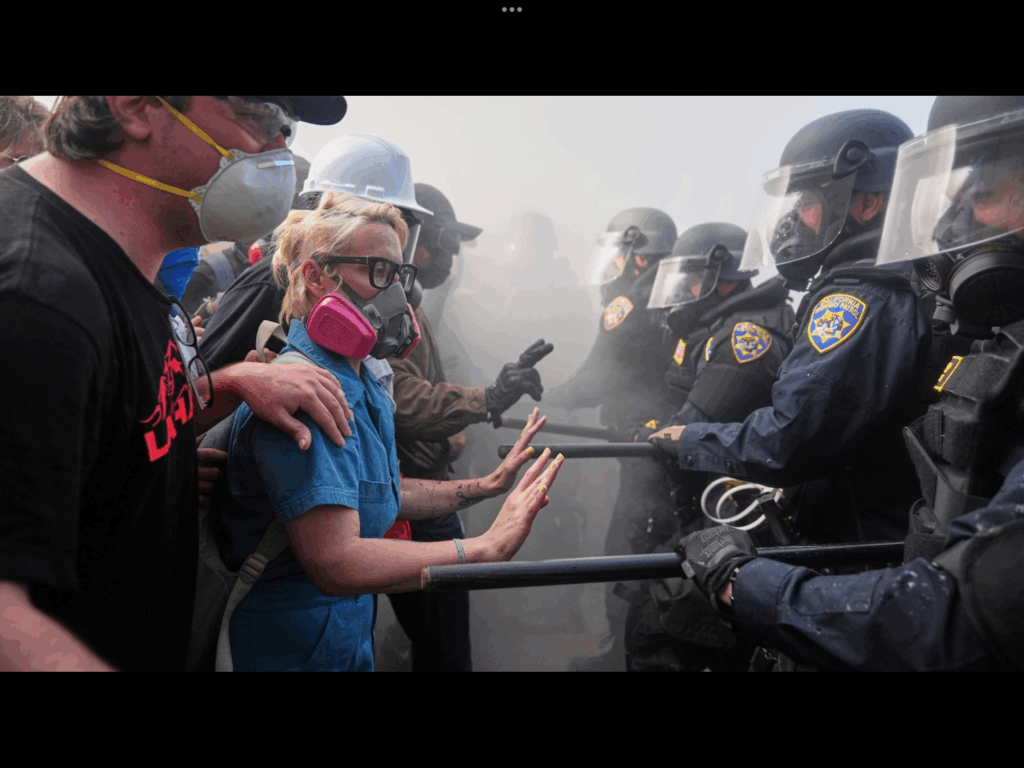They came in Humvees, flak jackets, and silence.
Seven hundred Marines, fresh out of Twentynine Palms, rolled into Los Angeles under federal orders not requested, not needed, and not lawful. Backed by 2,100 federalized National Guard troops, they weren’t sent to aid in wildfire relief. They weren’t here for earthquakes. They came because Donald Trump didn’t like the sound of protest.
And now the city that helped define protest in the 1960s finds itself staring down a militarized bluff from a president who still hasn’t invoked the Insurrection Act—but is practically begging for an excuse to.
Make no mistake: this is a test deployment.
The mission, officially, is to “protect federal property and personnel,” a recycled justification from the playbook of authoritarian ambition. Protesters have rallied near ICE offices and federal courthouses, furious over the latest wave of raids and deportations ordered by Trump’s second-term crackdown on immigration. And so, like a fever dream of Nixon with better tanks, Trump dispatched troops to California’s largest city without consulting the state or its people.
It is, legally, a flex. The Marines cannot arrest. They cannot search, seize, or subdue. That’s thanks to the Posse Comitatus Act of 1878, which prohibits active-duty military from engaging in domestic law enforcement. Unless, of course, the president invokes the Insurrection Act, which allows that very thing if rebellion—or the threat of it—is declared.
Which is why this should terrify anyone west of Washington.
Trump doesn’t need cause. He needs a headline.
And all it takes is a protest that lingers too long, or a Molotov too close to a federal office, and a general somewhere with political ambitions might declare, “Sir, we have grounds.” The invocation of the Insurrection Act then becomes a matter not of law, but of loyalty.
What we’re witnessing is not just a violation of California’s sovereignty. It’s the execution of a doctrine that says statehood is conditional. That red states may govern themselves, but blue states must kneel.
If this were Alabama or Mississippi, does anyone truly believe Marines would be walking the streets without a governor’s request? Does anyone imagine the White House would override local mayors and police chiefs, bypass state legislatures, and roll armored vehicles into Jackson or Mobile?
California did not ask for help. California did not consent. But under Title 10 of the U.S. Code, Trump federalized the Guard and dispatched Marines under the claim of “imminent threat to federal property.” That phrase is now as elastic as “weapons of mass destruction” or “enhanced interrogation.” It is language meant to bypass Congress, bulldoze governors, and dare the courts to keep up.
Let’s pause for a moment on what these Marines can and cannot do:
- ✅ Can: Protect federal facilities (ICE offices, courthouses, storage depots)
- ✅ Can: Assist National Guard troops with logistics and security perimeters
- ✅ Can: Intimidate with presence
- ❌ Cannot: Make arrests
- ❌ Cannot: Search private property
- ❌ Cannot: Engage in direct law enforcement
- ❌ Cannot: Use force on civilians unless under Insurrection Act
Yet how many Americans will stop to parse legal nuance when they see camouflage-clad soldiers flanking downtown?
This isn’t law and order. It’s theater and threat.
And it’s drenched in hypocrisy.
For decades, Republicans have cloaked themselves in the sanctity of states’ rights—a banner they unfurled to fight desegregation, defy the EPA, and dismantle the Voting Rights Act. But suddenly, when California defends immigrants, when Los Angeles refuses to become a staging ground for ICE raids, states’ rights vanish beneath the treads of a military convoy.
The truth is, states’ rights have always been a conditional principle on the American right: sacred only when they serve federal power’s retreat. And now, in 2025, that retreat has reversed direction.
Trump’s calculus is simple. Create chaos, claim control. The border is his excuse, California is his foil, and the Marines are his middle finger to anyone still clinging to the illusion of federalism.
Meanwhile, LA officials—mayors, councilmembers, police—are left in the dark. Governor Newsom, along with Attorney General Rob Bonta, has sued the federal government, calling the deployment “unconstitutional and unlawful.” But litigation moves at the pace of molasses, while military boots move at 60 mph.
This is the paradox of protest under authoritarian drift: the more peaceful your demonstration, the easier it is to ignore. The more urgent your cries, the more quickly they’re criminalized.
And somewhere, a president who has already spoken warmly of military rule in other nations watches the results unfold. He doesn’t need Los Angeles to explode. He needs one spark. One tweet’s worth of footage. One moment of unrest to spin as a civil war.
Because then, the Insurrection Act is “needed.”
Then, Posse Comitatus is “suspended.”
Then, the Marines go from standing by to standing in.
And then, California burns not from fire, but from betrayal.

